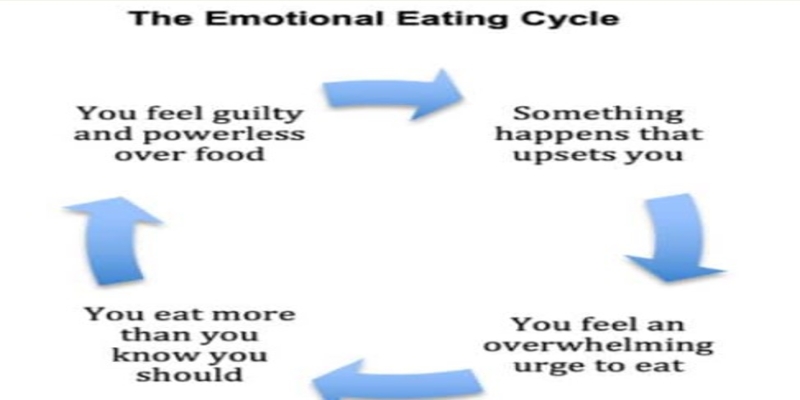4 Most Related Emotions Cause Overeating and What to Replace Emotional Eating with
Sep 03, 2024 By Isabella Moss
Do you run toward the pantry when you feel exhausted, stressed, or otherwise upset? Don't worryyou're not alone. It's common for people to turn to food for comfort as a way to cope with difficult and big emotions.
Eating is said to be emotional eating when you start eating in response to your emotions. Sometimes, everyone had done it.
Whenever you feel lonely, stressed, bored, or upsetyou are just stuck in an unhealthy food cycle where the actual problem and feeling are not addressed. Emotional hunger can't be satisfied only with food. There are multiple ways to cope with it. Here, find out the four most related emotions that cause overeating and what to replace emotional eating with.

4 Most Related Emotions Cause Overeating
We sometimes eat to satisfy our physical hunger. Most of us run to food to relieve stress, comfort, or reward ourselves. Stress, anger, boredom, or upset are the four most related emotions cause overeating.
When we do it, we used to pick junk and unhealthy food options to fill this emotional need. Feeling bored, let's order a pizza. You might go for a pint of ice cream during anger or swing by the drive-through after a long, stressful work day.
Emotional overeating is eating to make yourself feel goodto satisfy an emotional need rather than your stomach. But it doesn't sort out your emotional problems; it even makes you feel worse. Later, not only does the actual emotional problem stay, but you also feel guilty for overeating. To cure the emotional eating, lets understand its cycle first.
Emotional Eating Cycle
Sometimes, eating food as a reward or to celebrate something isn't a bad idea. But when eating is an emotional coping strategy, most of the time, here's the problem.
Whenever you feel upset, stressed, lonely, angry, bored, or exhausted, you impulsively run to open the refrigerator. Then, you get entangled in an unhealthy eating pattern, and the original problem or feeling is stayed there.

There are multiple ways to fill the emotional hunger. At first, eating may feel better, but the feeling that provokes the eating is persistent. And then you often feel worse than ever because of the abundance of unnecessary calories you've just taken in. You curse yourself for messing up with no more willpower.
Ultimately, you stop learning and practicing healthier ways to fix your emotions. You struggle harder and harder to control your weight and suddenly feel powerless over both your feelings and food. No matter how helpless you feel, it's possible to make a good and positive change. You can acquire healthier ways to deal with this emotional eating, prevent triggers, and battle cravings.
It's finally time to put a stop to emotional eating. But are you actual emotional eater?
Are You an Emotional Eater?
First, identify your eating habits to know if you are an emotional overeater. Ask yourself the following enlisted questions;
- Do you tend to eat when youre feeling low or stressed?
- Do you tend to eat when you don't feel hungry or full?
- Do you tend to reward yourself with food?
- Does food comfort you?
- Do you eat to feel good during low times?
- Do you tend to eat until you stuffed yourself with food?
- Do you feel impulsive or helpless around the food?
- Do you feel like food is your buddy?
What to Do Instead of Emotional Eating?
Changing habits like emotional eating can be tricky, but it is now impossible. Here, we describe the practices to fix emotional eating.
Perform Other Practices to Feed Your Feelings
If you don't know how to fix emotional damage in a way that doesn't have food, you cannot stop yourself from overeating for very long.
Once you identify your triggers, you can start to make changes. Find out alternatives to food to feed your emotions. For example;
- If you observe that you tend to eat when feeling stressed, offer yourself a shot of coffee, light scented candles, take a shower, or wrap yourself in a warm blanket.
- If loneliness is the reason you overeat, call a friend who makes you feel good, see your favorite photo to cherish memories, or play with your pet.
- If you feel bored, you can watch movies or comedy shows, read books, or practice an activity you enjoy the most (playing guitar, scrapbooking, etc.).
- While experiencing anxiety, you can eliminate negative energy by dancing to your favorite song, taking a brisk walk, or playing games.
Identify Your Emotional Overeating Triggers
The first step to avoiding emotional eating is to identify your triggers. What emotions cause overeating? What places, or circumstances make you approach food comfort? Most of the time, emotional feelings are connected to negative emotions. Still, they can also be provoked by positive feelings like celebrating events or holidays or rewarding yourself for accomplishing goals.
Keep a Record of Your Feelings
The more closely you know about your feelings, the better. Eating in response to emotions can be out of control. The more you know how you feel when you do certain actions, the more possibilities there are for changing patterns.
Keep a record of those times when you eat but are not hungry. Record the following things;
- What was happening
- How was your feelings
- Emotions you observe when you urge to eat.
- Keep a record of places and situations you eat.
- Which emotion is most often related to overeating?
Remember not to judge yourself on your findings. Be kind as you start to discover your habits; they don't need to be perfect.
Practice Mindfulness
Mindfulness comes with multiple benefits for mental health. Studies report that it's a powerful way to manage stress and anxiety along with coping with stress eating.
Mindfulness is an activity of paying attention to the moment you're present. Here, perform the following mindfulness practices to diminish stress, anxiety, or upset triggers of youre eating;
- Sit quietly for at least five minutes and focus on your breathing.
- Observe the tense areas of your body and purposefully relax them.
- Listen to soothing meditation music.
- Concentrate on the things in your surroundings and name a few things you can smell, see, hear, taste, and touch.
Mindful eating helps you slow down and recognize food's texture, smell, and flavors. Is it food? What type of food is it? If not, what is needed now? But it may take some time to learn to be a mindful eater.
Observe your Appetite
If you're diet-conscious, it's a bit challenging to notice your fullness or hunger cues. It may take some time to begin to observe what physical hunger or fullness feels like.
Be aware of your physical hunger signals, which can assist you in noticing when you are eating for emotional reasons. Physical hunger cues include;
If you want to link with your hunger and fullness, rank your hunger on a scale of one to ten. If you rank your hunger 7-9, then go with protein-rich food options to fulfil your hunger.

Bottom Line
Emotional eating and overeating are everyday experiences mostly linked to physical hunger. Anyone who experiences unpleasant emotions related to their eating behaviors should visit a doctor to discuss the problem. They can also consult a registered nutritionist or therapist to help them find coping techniques and solutions. Here, we enlist most related emotions that cause overeating and what to replace emotional eating with. Hope it helps you.
-
 Recovery Sep 03, 2024
Recovery Sep 03, 20244 Types of Negative Self-Talk That Are Holding You Back From Your Best Life
Let's find out the four types of negative self-talk that are holding you back from your best life
-
 Condition Dec 14, 2023
Condition Dec 14, 2023When You Have Diverticulitis, Should You Avoid Certain Foods?
If you know anything about diverticulitis, you've probably been "recommended" to avoid the following. You are avoiding nuts, seeds, popcorn, and corn because they aggravate the condition. As it happens, that's bad guidance. Following the National Institute of Diabetes but instead Digestive Kidney Diseases, there is no proof that these foods increase the risk (NIDDK).
-
 Condition Feb 23, 2024
Condition Feb 23, 2024What Can Cause an Abnormal Pap Smear: All You Need To Know
If you get an abnormal test, it suggests your cervix has experienced cell alterations. Having this symptom may not always indicate cervical cancer
-
 Condition Oct 14, 2023
Condition Oct 14, 2023What You Need To Know About The Best Online Therapy Services
Online therapy refers to mental health services delivered through the internet. Popular forms include video therapy, text-based therapy, apps-based therapy, and online CBT. Benefits include convenience, affordability, increased accessibility, and anonymity. Risks include the potential for lower quality of care, technical difficulties, limited interaction, and legal/ethical concerns. Choosing a reputable service with qualified therapists and strict privacy standards is essential.
